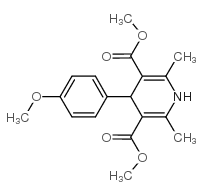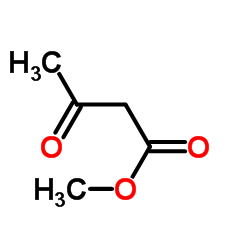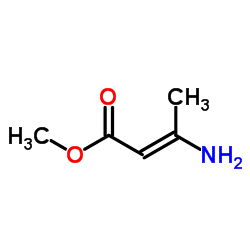73257-47-3
| Name | dimethyl 4-(4-methoxyphenyl)-2,6-dimethyl-1,4-dihydropyridine-3,5-dicarboxylate |
|---|---|
| Synonyms |
1,4-dihydro-2,6-dimethyl-4-(p-methoxyphenyl)pyridine-3,5-dicarboxylic acid dimethyl ester
dimethyl 1,4-dihydro-4-(4-methoxyphenyl)-2,6-dimethyl-3,5-pyridinedicarboxylate Dimethyl 4-(4-methoxyphenyl)-2,6-dimethyl-1,4-dihydro-3,5-pyridinedicarboxylate dimethyl 1,4-dihydro-4-(4-methoxyphenyl)-2,6-dimethylpyridine-3,5-dicarboxylate 2,6-dimethyl-3,5-di(methoxycarbonyl)-4-(p-methoxyphenyl)-1,4-dihydropyridine 1,4-dihydro-2,6-dimethyl-4-(4-methoxyphenyl)-3,5-pyridinedicarboxylic acid dimethyl ester 4-(4-methoxyphenyl)-2,6-dimethyl-3,5-dimethoxycarbonyl-1,4-dihydropyridine |
| Density | 1.164g/cm3 |
|---|---|
| Boiling Point | 458.3ºC at 760 mmHg |
| Melting Point | 173ºC |
| Molecular Formula | C18H21NO5 |
| Molecular Weight | 331.36300 |
| Flash Point | 231ºC |
| Exact Mass | 331.14200 |
| PSA | 73.86000 |
| LogP | 2.60480 |
| Index of Refraction | 1.531 |
Synonym: Section 2 - COMPOSITION, INFORMATION ON INGREDIENTS
Risk Phrases: None Listed. Section 3 - HAZARDS IDENTIFICATION EMERGENCY OVERVIEW
Not available. Potential Health Effects Eye: May cause eye irritation. Skin: May cause skin irritation. May be harmful if absorbed through the skin. Ingestion: May cause irritation of the digestive tract. May be harmful if swallowed. Inhalation: May cause respiratory tract irritation. May be harmful if inhaled. Chronic: Not available. Section 4 - FIRST AID MEASURES Eyes: Flush eyes with plenty of water for at least 15 minutes, occasionally lifting the upper and lower eyelids. Get medical aid. Skin: Get medical aid. Flush skin with plenty of water for at least 15 minutes while removing contaminated clothing and shoes. Ingestion: Get medical aid. Wash mouth out with water. Inhalation: Remove from exposure and move to fresh air immediately. Notes to Physician: Treat symptomatically and supportively. Section 5 - FIRE FIGHTING MEASURES General Information: As in any fire, wear a self-contained breathing apparatus in pressure-demand, MSHA/NIOSH (approved or equivalent), and full protective gear. Extinguishing Media: Use water spray, dry chemical, carbon dioxide, or chemical foam. Section 6 - ACCIDENTAL RELEASE MEASURES General Information: Use proper personal protective equipment as indicated in Section 8. Spills/Leaks: Vacuum or sweep up material and place into a suitable disposal container. Section 7 - HANDLING and STORAGE Handling: Avoid breathing dust, vapor, mist, or gas. Avoid contact with skin and eyes. Storage: Store in a cool, dry place. Store in a tightly closed container. Section 8 - EXPOSURE CONTROLS, PERSONAL PROTECTION Engineering Controls: Use adequate ventilation to keep airborne concentrations low. Exposure Limits CAS# 73257-47-3: Personal Protective Equipment Eyes: Not available. Skin: Wear appropriate protective gloves to prevent skin exposure. Clothing: Wear appropriate protective clothing to prevent skin exposure. Respirators: Follow the OSHA respirator regulations found in 29 CFR 1910.134 or European Standard EN 149. Use a NIOSH/MSHA or European Standard EN 149 approved respirator if exposure limits are exceeded or if irritation or other symptoms are experienced. Section 9 - PHYSICAL AND CHEMICAL PROPERTIES Physical State: Solid Color: white Odor: Not available. pH: Not available. Vapor Pressure: Not available. Viscosity: Not available. Boiling Point: Not available. Freezing/Melting Point: 173 - 177 deg C Autoignition Temperature: Not available. Flash Point: Not available. Explosion Limits, lower: Not available. Explosion Limits, upper: Not available. Decomposition Temperature: Solubility in water: Specific Gravity/Density: Molecular Formula: C18H21NO5 Molecular Weight: 331 Section 10 - STABILITY AND REACTIVITY Chemical Stability: Not available. Conditions to Avoid: Incompatible materials. Incompatibilities with Other Materials: Strong oxidizing agents. Hazardous Decomposition Products: Nitrogen oxides, carbon monoxide, carbon dioxide. Hazardous Polymerization: Has not been reported Section 11 - TOXICOLOGICAL INFORMATION RTECS#: CAS# 73257-47-3 unlisted. LD50/LC50: Not available. Carcinogenicity: Dimethyl Not listed by ACGIH, IARC, or NTP. Section 12 - ECOLOGICAL INFORMATION Section 13 - DISPOSAL CONSIDERATIONS Dispose of in a manner consistent with federal, state, and local regulations. Section 14 - TRANSPORT INFORMATION IATA No information available. IMO No information available. RID/ADR No information available. Section 15 - REGULATORY INFORMATION European/International Regulations European Labeling in Accordance with EC Directives Hazard Symbols: Not available. Risk Phrases: Safety Phrases: S 24/25 Avoid contact with skin and eyes. WGK (Water Danger/Protection) CAS# 73257-47-3: No information available. Canada None of the chemicals in this product are listed on the DSL/NDSL list. CAS# 73257-47-3 is not listed on Canada's Ingredient Disclosure List. US FEDERAL TSCA CAS# 73257-47-3 is not listed on the TSCA inventory. It is for research and development use only. SECTION 16 - ADDITIONAL INFORMATION N/A |
| Safety Phrases | S24/25 |
|---|
|
~10% 
73257-47-3 |
| Literature: Tamaddon, Fatemeh; Razmi, Zahra; Jafari, Abbas Ali Tetrahedron Letters, 2010 , vol. 51, # 8 p. 1187 - 1189 |
|
~60% 
73257-47-3 |
| Literature: Khadilkar, Bhushan M.; Gaikar, Vilas G.; Chitnavis, Ashish A. Tetrahedron Letters, 1995 , vol. 36, # 44 p. 8083 - 8086 |
|
~61% 
73257-47-3 |
| Literature: Plotnietse; Tirzitis; Uldrikis; Koronova; Tirzite; Makarova; Duburs Chemistry of Heterocyclic Compounds, 1996 , vol. 32, # 10 p. 1166 - 1172 |
|
~15% 
73257-47-3 |
| Literature: Filipan-Litvic, Mirela; Litvic, Mladen; Cepanec, Ivica; Vinkovic, Vladimir Molecules, 2007 , vol. 12, # 11 p. 2546 - 2558 |
|
~% 
73257-47-3 |
| Literature: Filipan-Litvic, Mirela; Litvic, Mladen; Vinkovic, Vladimir Tetrahedron, 2008 , vol. 64, # 24 p. 5649 - 5656 |
| Precursor 4 | |
|---|---|
| DownStream 1 | |




